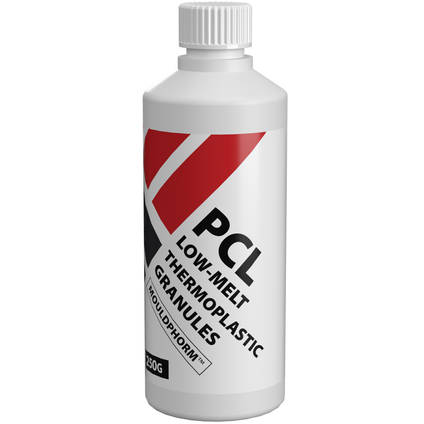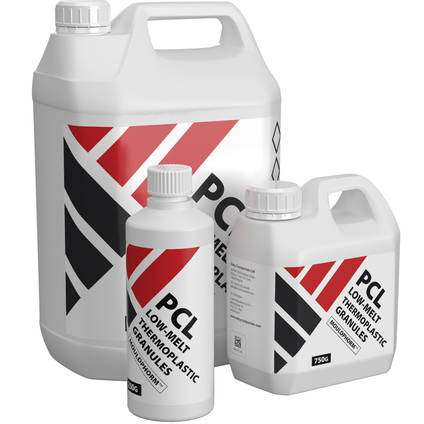Need any help or advice?+44 (0)1782 454499
Specification
Product Data
| Colour | White | |
|---|---|---|
| Chemistry / Material | Polycaprolactone | |
| Density | 1.145 | g/cm³ |
Mechanical Properties
| Max Service Temp | 45 | °C |
|---|
General Properties
| Gross Weight | 0.305 | kg |
|---|
Shipping Information
Restrictions
This product is not classed as dangerous goods for transport and can be shipped to all destinations without restriction.
Package Size
There are no package size restrictions or surcharges for this product.
Delivery Cost
To find the delivery cost of this item to your address, add it to your basket and then use the instant shipping calculator on the basket page.
Mouldphorm PCL Low-Melt Moulding Granules
- MP-PCL-025
- No reviews
These remarkable low-melting point PCL (Polycaprolactone) thermoplastic granules can be melted in hot water and then applied by hand to take simple temporary moulds off basic pattern forms, or shaped into simple fittings or ergonomic forms for a range of applications.
Sold in a range of pack sizes from 250g to 4kg.
PRODUCT VERSIONS
Pack Size
AVAILABILITY:4 in stock available for immediate shipping
We won’t be beaten on price!
If you believe you’re buying an equivalent product cheaper elsewhere, contact us to discuss your requirements.
Mouldphorm™ is a remarkable PCL (Polycaprolactone) thermoplastic compound or mouldable plastic pellets (often referred to as Polymorph) which melts at 62°C by submerging the granules in hot water. Once melted, the granules can be pressed together to make a homogeneous, pliable mouldable plastic which can be shaped for a variety of applications ranging from simple hand-formed prototypes to operational composite moulds.
The low melting temperature also makes Polymorph moldable plastic pellets uniquely suitable for anatomic moulding applications where you want to create an accurate mould of a bodypart such as a forearm, shin, knuckle, elbow etc. These moulds can then be used to produce perfect fit sports protection or equipment.
Moulds made using Mouldphorm™ are ideally suited for composites laminating applications because most resin systems will naturally release off Mouldphorm™ without the need for waxes or release agents.
As well as mould making, Polymorph plastic can also be used to create fully functional moulded parts or prototypes, handles, grips, prototypes, toys, masks and costume parts . When cooled, Mouldphorm™ is strong and durable with good tensile strength and excellent resilience to breakage.
Mouldphorm™ can be melted and re-used indefinitely.
Mouldphorm™ is biodegradable.
Further Information
How to Use
- Fill a suitable vessel with boiling water.
- Pour your desired amount of Mouldphorm™ into the water. There should be no danger of the Mouldphorm™ sticking to the vessel so no precautions are required).
- Wait for the Mouldphorm™ granules to change from white to clear. Allow this to happen fully. If you have a lot of granules and not a lot of water it is possible that the granules will cool the water below 62°C and not melt properly. If this happens, add more water or change the water for new boiling water.
- Once the granules have become fully transparent, remove them from the water using tongs. DO NOT put your hands in boiling or very hot water.
- CAUTION: If the Mouldphorm™ plastic is much above 62deg;C then allow it to cool slightly before handling. Exercise caution when handling.
- Whilst still pliable, Mouldphorm™ can be moulded into shape by hand, pressed against a pattern or former to create a mould or smoothed and shaped onto a bodypart, such as a shin, to capture anatomical detail. If moulding anatomical detail, a release film or clingfilm over this skin is recommended to prevent the Mouldphorm™ from sticking to hairs!
- Wait whilst Mouldphorm™ cools. Once cooled the plastic will return to its opal white appearance.
Mouldphorm™ is a remarkable PCL (Polycaprolactone) thermoplastic compound or mouldable plastic pellets (often referred to as Polymorph) which melts at 62°C by submerging the granules in hot water. Once melted, the granules can be pressed together to make a homogeneous, pliable mouldable plastic which can be shaped for a variety of applications ranging from simple hand-formed prototypes to operational composite moulds.
The low melting temperature also makes Polymorph moldable plastic pellets uniquely suitable for anatomic moulding applications where you want to create an accurate mould of a bodypart such as a forearm, shin, knuckle, elbow etc. These moulds can then be used to produce perfect fit sports protection or equipment.
Moulds made using Mouldphorm™ are ideally suited for composites laminating applications because most resin systems will naturally release off Mouldphorm™ without the need for waxes or release agents.
As well as mould making, Polymorph plastic can also be used to create fully functional moulded parts or prototypes, handles, grips, prototypes, toys, masks and costume parts . When cooled, Mouldphorm™ is strong and durable with good tensile strength and excellent resilience to breakage.
Mouldphorm™ can be melted and re-used indefinitely.
Mouldphorm™ is biodegradable.
Further Information
How to Use
- Fill a suitable vessel with boiling water.
- Pour your desired amount of Mouldphorm™ into the water. There should be no danger of the Mouldphorm™ sticking to the vessel so no precautions are required).
- Wait for the Mouldphorm™ granules to change from white to clear. Allow this to happen fully. If you have a lot of granules and not a lot of water it is possible that the granules will cool the water below 62°C and not melt properly. If this happens, add more water or change the water for new boiling water.
- Once the granules have become fully transparent, remove them from the water using tongs. DO NOT put your hands in boiling or very hot water.
- CAUTION: If the Mouldphorm™ plastic is much above 62deg;C then allow it to cool slightly before handling. Exercise caution when handling.
- Whilst still pliable, Mouldphorm™ can be moulded into shape by hand, pressed against a pattern or former to create a mould or smoothed and shaped onto a bodypart, such as a shin, to capture anatomical detail. If moulding anatomical detail, a release film or clingfilm over this skin is recommended to prevent the Mouldphorm™ from sticking to hairs!
- Wait whilst Mouldphorm™ cools. Once cooled the plastic will return to its opal white appearance.
Specification
Product Data
| Colour | White | |
|---|---|---|
| Chemistry / Material | Polycaprolactone | |
| Density | 1.145 | g/cm³ |
Mechanical Properties
| Max Service Temp | 45 | °C |
|---|
General Properties
| Gross Weight | 0.305 | kg |
|---|
Yes, certainly. Mouldphorm can be used to make temporary moulds suitable for use in wet lay applications with most standard resin systems. It's worth pointing out that it is best-suited for smaller moulds (let's say palm-sized) rather than larger moulds simply owing to the practicality of forming the material into the mould before it cools and hardens.
Yes the Mouldphorm can be reheated and melted down and reused.
No, unfortunately when heated to even higher temperatures, although the viscosity does reduce making the plastic more runny, it becomes much more sticky and will grip to surfaces rather than running like a liquid. This means, that in a practical sense, it cannot be poured over objects to create a mould.
Mouldphorm does not stick to most resins, including PU, Polyester and epoxies and as such makes a good temporary mould for casting such resins.
Yes, subject to adequate cooling it will machine much like other soft thermoplastics. However, Mouldphorm has such a low melting point that, without additional cooling, many power tool based machining processes will impart too much heat causing the plastic to soften.
The Nature of Mouldphorm is such that when being moulded in its molten state, it is possible to trap small air bubbles leaving voids on the surface of the moulding. This is hard to avoid so where fine surface detail is critical, we would recommend using the Mouldphorm only to take the initial rough moulding or pattern before surface detail becomes critical.
ASK YOUR OWN QUESTION
Customer Product Reviews for Mouldphorm PCL Low-Melt Moulding Granules
SUBMIT YOUR OWN PRODUCT REVIEW
We publish all reviews for verified purchases. Submit your own review and help other customers with their choices.SUBMIT YOUR OWN PRODUCT REVIEW
We publish all reviews for verified purchases. Submit your own review and help other customers with their choices.Shipping Information
Restrictions
This product is not classed as dangerous goods for transport and can be shipped to all destinations without restriction.
Package Size
There are no package size restrictions or surcharges for this product.
Delivery Cost
To find the delivery cost of this item to your address, add it to your basket and then use the instant shipping calculator on the basket page.
100% SECURE
PAYMENT METHODS
Easy Composites EU B.V., registered in the Netherlands 73601195. All content copyright (C) Easy Composites Ltd, 2025. All rights reserved.

